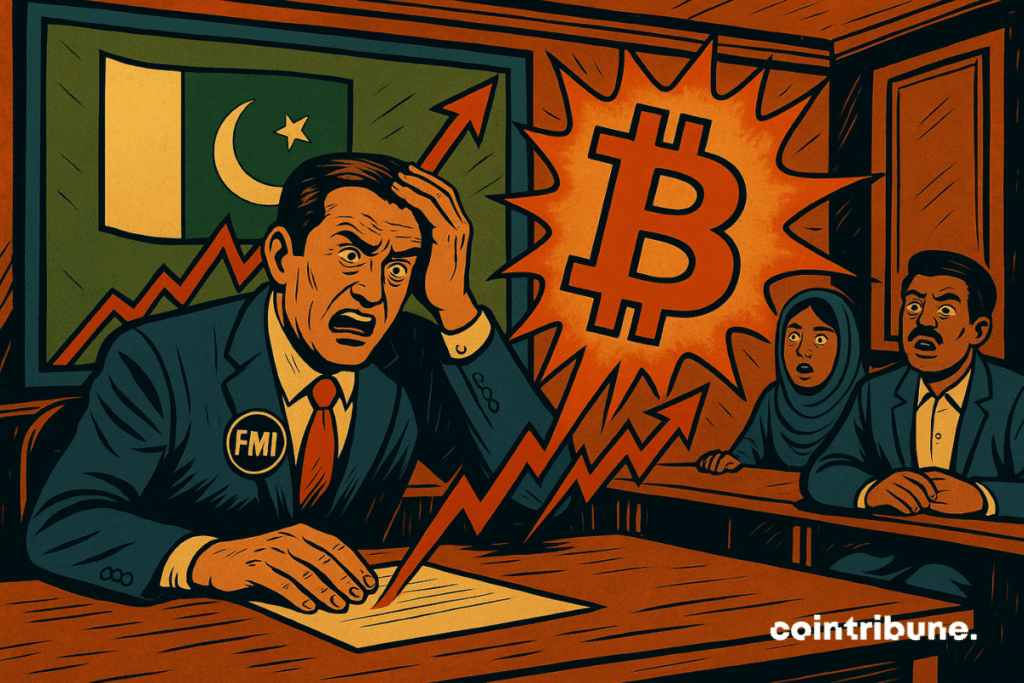The IMF Is Concerned About Pakistan's Bitcoin Mining Plan
The International Monetary Fund has ears everywhere, especially when it comes to its assisted countries. There is no need for in-depth investigations when public announcements betray intentions. Pakistan, freshly converted to the crypto fever, has just launched a major program to mine bitcoin and build a state reserve in crypto. The announcement was explosive, but the shockwave was quick to follow. The IMF, always quick to protect its conditions, has firmly pulled Islamabad’s ears.

In Brief
- The IMF demands explanations from Pakistan about the energy use related to the bitcoin mining plan.
- Pakistan launched a national wallet and a state reserve in bitcoin without prior consultation.
- 2,000 megawatts promised to mining raise concerns amid a historic and explosive energy crisis.
- 55% increase in electricity prices since 2021 fuels social anger that is hard to contain.
The IMF steps in: crypto under condition in Pakistan
Pakistan, in the middle of budget renegotiations with the IMF, has decided to allocate 2,000 megawatts of electricity to bitcoin mining and AI data centers. The announcement was not discussed with the institution. A strategic error. The IMF demands urgent clarifications regarding the legality of bitcoin in the country, as well as the energy allocation. Its concern: seeing vital energy diverted in favor of poorly regulated projects.
“There is a fear of even tougher discussions with the IMF over this initiative“, says a source close to the matter.
The IMF, which previously banned the accumulation of bitcoin in El Salvador, requires that any financial policy changes be coordinated within the Extended Fund Facility program. Pakistan’s response is pending, but the atmosphere is tense.
The consequences could be severe. Refusing to comply could suspend vital financial aid, or even worsen tensions on the debt markets. In the short term, this would jeopardize funds intended to support the local economy. In the long term, it would further isolate the country in an already fragile economic context.
Bitcoin, which was supposed to symbolize openness and innovation, here becomes a warning sign for creditors.
State Bitcoin: Boldness or recklessness?
This pro-crypto turnaround is no accident. In February 2025, the Pakistani government proposed the creation of the “National Crypto Council” to structure the national crypto ecosystem. Then, in May, the Pakistan Digital Asset Authority (PDAA) was created. It is responsible for regulating exchanges, wallets, stablecoins, and DeFi platforms. It is also tasked with supervising the tokenization of state assets.
The Bitcoin Vegas 2025 summit served as a showcase for this strategy. Bilal bin Saqib, the Prime Minister’s crypto advisor, unveiled the country’s first strategic bitcoin reserve. He also announced the launch of a national bitcoin wallet. According to him:
Our youth is connected and on the blockchain. Pakistan is now recognized for its future, not its past.
Among the unveiled projects:
- National bitcoin reserve;
- Official wallet supported by the state;
- Incentives to attract miners and developers;
- Legal framework aligned with FATF standards.
The idea? Make Pakistan an emerging crypto hub, attracting capital, startups, and technological expertise. In April, even Changpeng Zhao, former Binance CEO, was appointed advisor to the Crypto Council. He was to assist the country in setting up a blockchain infrastructure.
But this bold strategy has hit the wall of economic realism. Has Pakistan measured the geopolitical and fiscal implications? Or is it acting with a kind of insolence, openly defying the IMF? The answer could redraw the future of its digital ambitions.
Energy crisis: when bitcoin mines the people
Pakistan’s energy context is explosive. Since 2021, electricity prices have jumped 155%. The average cost reaches $0.23/kWh, pushing industries and households to turn to solar power. The infrastructure is outdated, line losses reach 16%, and outages are frequent. The country subsidizes inactive power plants while imposing tariff increases to satisfy the IMF. In July, residential prices increased again by 18%.
In this energy chaos, allocating 2,000 MW to bitcoin mining appears heretical. The country is already struggling to provide stable electricity to its people. The announcement thus raises a double concern: economic and social.
Some numbers to remember:
- 16% electricity lost due to technical inefficiencies
- 155% increase in prices in 4 years;
- $0.23/kWh: average household cost;
- 2,000 MW promised to miners despite massive outages;
- 40 million registered crypto wallets in Pakistan.
The risk is real: diverting energy to bitcoin data centers risks inflaming tensions. It would worsen energy poverty, fuel popular anger, and could provoke unrest. Investing in mining without solving the energy chaos would be like laying a minefield on an already unstable field.
The IMF sometimes revises its position. Did it not recently admit that there is no bitcoin accumulation for El Salvador? Pakistan should take inspiration from this momentum: engage in dialogue, structure a clear framework, and prove that mining can coexist with its commitments. Negotiating is not yielding, especially when innovation knocks at the door.
Maximize your Cointribune experience with our "Read to Earn" program! For every article you read, earn points and access exclusive rewards. Sign up now and start earning benefits.
La révolution blockchain et crypto est en marche ! Et le jour où les impacts se feront ressentir sur l’économie la plus vulnérable de ce Monde, contre toute espérance, je dirai que j’y étais pour quelque chose
The views, thoughts, and opinions expressed in this article belong solely to the author, and should not be taken as investment advice. Do your own research before taking any investment decisions.